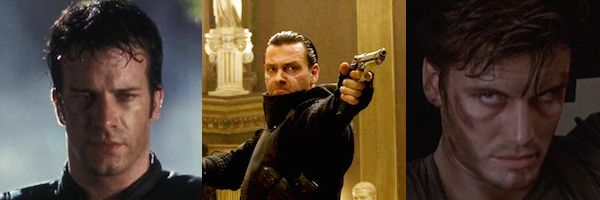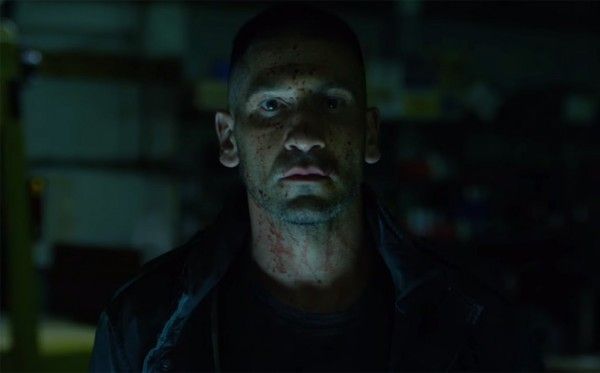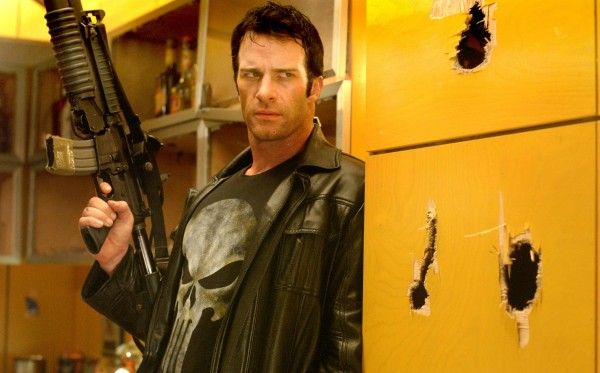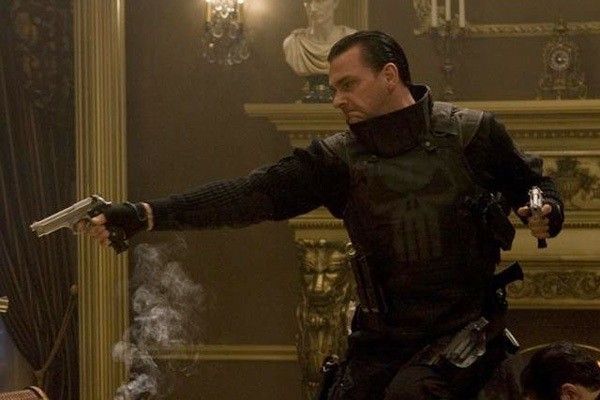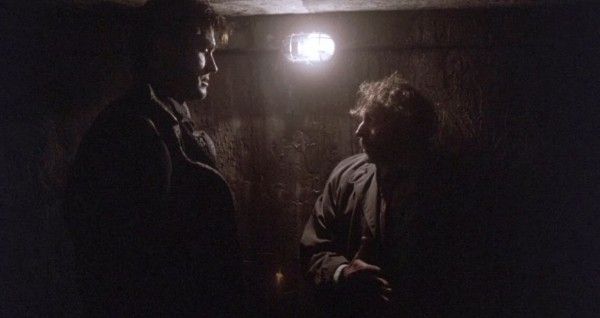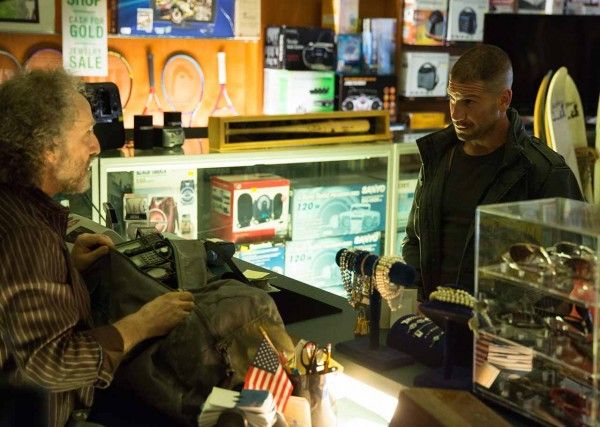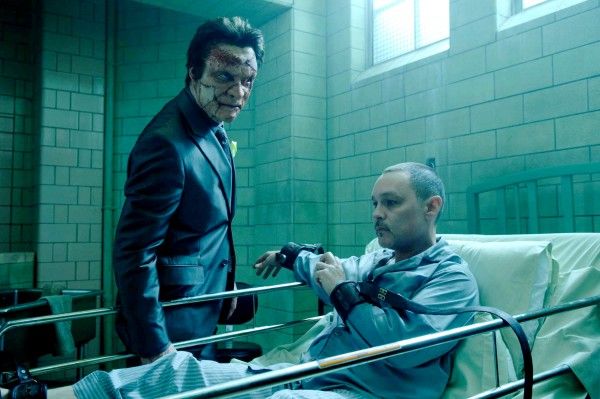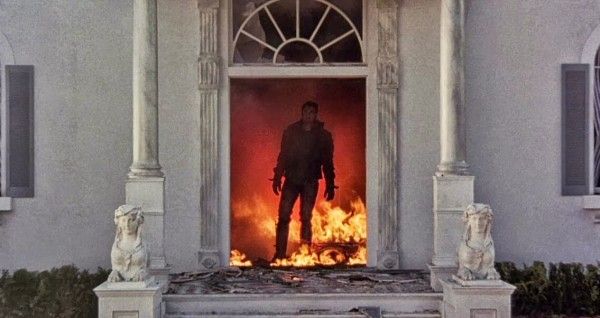If you’re like me, you spent this past weekend doing little more than mainlining the second season of Netflix’s Daredevil, the best adaptation of a Marvel property to hit the big or small screen by a mile. (Or maybe you have some self-control and are savoring each episode, which might very well be for the better.) Having finished the new season, easily one of the best of 2016, it’s hard to locate a singular highlight of the 13 episodes – the acting is phenomenal, and the technical work, from the cinematography to the fight choreography to the exemplary editing, is equally astounding. But the obvious fan favorite, for good reason, is Jon Bernthal’s performance as Frank Castle, the vigilante who becomes known as The Punisher, which offers a surprisingly nuanced and convincing counterpoint to Matthew Murdock’s (Charlie Cox) restrained sense of forgiving justice.
Bernthal is the fourth man to take on the character and, not surprisingly, the best, as much thanks to the writing on the series as Bernthal himself, who follows up his excellent work on The Walking Dead beautifully here. The detail is in his sensitivity, finding the torn-apart heart of Castle where nearly every other iteration of the character on screen has focused almost exclusively on his brutality, his belief in himself as an unshakeable barometer of justice. Where Frank Castle is the focus of the second season of Netflix’s series, it’s primarily The Punisher that is at the center of the three filmic incarnations of the comic book series originated by Gerry Conway, Stan Lee, and John Romita Sr.
To be fair, 2004’s The Punisher, which starred Thomas Jane in the role of Castle, did attempt to find a different side to the character, specifically in his humor and sense of creative thinking. Whereas the first filmic version of The Punisher, released in 1989 with Dolph Lundgren, depicted Castle as more of a lone wolf, the 2004 film saw the character magically brought back from his death during the massacre of his extended family by some sort of local witch doctor only to becomes besties with a trio of neighbors in Tampa while he plots his revenge. Though the action is not particularly remarkable, save for a fight between Castle and The Russian, a heavy played by Kevin Nash, it’s the film’s tacky sense of humor and camaraderie that builds between Castle, Bumpo (John Pinette), Spacker Dave (Ben Foster) and Joan (Rebecca Romijn) in a dingy apartment house that really feels at a distance from the source material.
Indeed, there’s very little to like about the film, from John Travolta’s unendurable performance as Howard Saint, the villain, to the deeply convoluted plotting, but one scene that sticks in the memory is Castle’s fake torturing of one of Saint’s minions, played by Ocean’s Eleven breakout Eddie Jemison, in which he convinces the hoodlum that the frost of a popsicle is in fact the feeling of his flesh being burned off. This scene, on its own, betrays a basic tenant of the character in nearly every variation of the series that’s been published thus far. The Punisher is not much for clever tricks and if he had to torture an immoral criminal for information, he would very simple torture them and then probably kill them. But the film, directed and co-written by Jonathan Hensleigh, labors intensely to not only make Castle primarily a symbol of familial protectiveness, but to make the film itself about community and the importance of family even when you do not have one.
Even in the film’s early moments, before the extermination of the Castle family, the character of Frank Castle is little more than a sardonic family man, an undercover FBI agent. There’s no sense of the soldier, or a philosophy of crime and punishment, that guides him; just a wanting to have a second child with his wife (Samantha Morton) before her demise. Both the 1989 Punisher and Punisher: War Zone evade this part of the story in general and find Castle well into his bloody crusade against gangsters and criminals of every sort. Only the latter of those two, however, conveys a full sense of the character’s origins in the vast mythology of comic books, setting Castle (Ray Stevenson) against Jigsaw (Dominic West), one of the hero’s most notorious archenemies. In fact, the entire film is marked by an often emptily narcissistic tone that one can find in certain runs of The Punisher comics, and the general aesthetic of the film suggests a zany, gory, and darkly comical cartoon.
That’s also a nice way of saying that Punisher: War Zone looks like absolute trash, from the junky production design to the unthinking framing. For whatever fidelity the film, directed by Lexi Alexander, has toward the more horrific elements of the source material, the film is a chore to watch and even its action-film bombast can’t quite save the more dramatic passages that force talented actors like West, Stevenson, Dash Mihok, and Doug Hutchinson to choke down thick slices of grim, overworked pap. Still, the film is openly campy, proud of every overblown moment, including when Hutchinson’s Loony Bin Jim preempts a murder with “yummy yummy yummy, in my tummy.”
Produced by Walking Dead head Gale Anne Hurd, War Zone is a movie that is comfortable with itself tonally, which is not something that can be said of the 2004 film, but it’s brashness only highlights how little it cares about the character of Frank Castle. The script by Art Marcum, Matt Holloway, and Nick Santora strips the character of his beliefs, and leaves him as little more than a mordant death dealer, beleaguered by his role as a vigilante rather than brought to life by it. The character is written as weighed down by the immoral arc of his new life and thus the film feels weighed down, ignoring the very real philosophy that the character has chosen to adopt as truly believable and galvanizing. Despite the focus on body parts, blood, and physical mutilation, the film is deeply, unmistakably moralistic in ways that leave a bitter aftertaste for a film that, at first glance, is near boastful in its trashiness.
There’s a similar sense of trash to the 1989 version of the character, embodied by Lundgren, but it’s of a much different sort. Punisher: War Zone comes off as one of those straight-to-DVD films that are too ludicrously violent, too willfully bad to be released, despite the fact that Lionsgate did indeed put the film out in the winter of 2008 to meager box office returns. Surprisingly, the 1989 film did not see release in America at all, and only eventually got released via the booming VHS market after being released in parts of Europe and Asia. If Sylvester Stallone or Arnold Schwarzenegger had been in the role, I imagine it would have been put out to mild action-enthusiast acclaim but Lundgren always had a tough time crossing over as a hero type. His first two roles, in the riotously awful Rocky IV and A View to a Kill, one of the least-respected James Bond volumes, were villain type primarily, and when he tried to go hero in Masters of the Universe and (arguably) Red Scorpio, the results were borderline catastrophic but not particularly because of Lundgren as a performer.
As an actor, he gives Castle a sense of imposing, but the script, courtesy of Fresh writer-director Boaz Yakin, gives him nothing to hang the character on beyond a general air of emotional devastation following the murder of his family by the Moretti crime family. The death of his wife and children is, ultimately, the only thing other than the title and the character’s name that ties it to the source material, as the narrative is seemingly identical to any of the formulaic action films that Lundgren, Stallone, and Schwarzenegger appeared in during the 1980s and 90s. The film is not unlike Stallone’s Cobra or the second Rambo film, and like those films, it’s devoid of personality in every sense of the word. Though its true that The Punisher more often goes after gangs and criminals that don’t have any mystical connections, Yakin’s script scrubs the villains, including the Yakuza, led by Lady Tanaka (Kim Miyori), and mafia big-shot Franco (Jeroen Krabbe), of any nuances beyond plain-old evil and power-hunger. Even Franco’s fear for his son, who is kidnapped by the Yakuza, seems to work more to underline the ruthlessness of Tanaka rather than give some (any!) insight into the mob figure.
The 1989 Punisher feels worked over brazenly to fit a market-tested demographic and fanbase, one that loves action films but thinks that comics are something that only children and nerds look at. In this sense, it certainly reflects the era of its production, and Castle is seen as a moralistic killing machine, one who murders with total efficiency and without mercy but has a special place in his heart for children. He is indeed sensitive but its in a way that every major hero is required to be in the action-film paradigm, whereas Bernthal’s sensitivities, beyond his love of dogs, are more challenging and speak to a belief that what he does is, as he puts it, “required” but that it’s also personally satisfying to him. Bernthal finally turns Frank Castle and The Punisher into an honest-to-goodness personality with layers of complicated thoughtfulness. He is a character that has mapped out his own unique morals, whereas the Castles of the 1989, 2004, and 2008 films are all denoted by an accepted morality, a basic way of fitting into the world where Bernthal’s creation is constantly at war with that world, both literally and figuratively.

